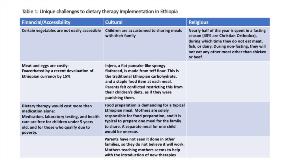Barriers to Implementation of Dietary Therapy for Pediatric Epilepsy in Ethiopia
Abstract number :
3.371
Submission category :
10. Dietary Therapies (Ketogenic, Atkins, etc.)
Year :
2018
Submission ID :
507287
Source :
www.aesnet.org
Presentation date :
12/3/2018 1:55:12 PM
Published date :
Nov 5, 2018, 18:00 PM
Authors :
Erin Fedak Romanowski, Mott Children's Hospital and Abate Yeshidinber, St. Paul’s Hospital Millennium Medical College
Rationale: Africa is the continent with the highest incidence and prevalence of epilepsy. Access to antiseizure medications is limited in low-middle income countries (LMIC), reducing opportunities for patients to achieve seizure freedom on medication alone. Dietary therapy for epilepsy is now widely used throughout the world, but remains largely unavailable in LMICs. The International League Against Epilepsy (ILAE) published recommendations for ketogenic diet services in LMICs, emphasizing the importance of expanding this treatment globally. The modified Atkins diet (MAD) does not require inpatient hospitalization, an on-site neurologist or dietician, and may be managed remotely. We hypothesized that MAD should be considered as a treatment option for pediatric epilepsy in LMICs such as Ethiopia, and sought to identify cultural and religious barriers that could limit implementation of the MAD. Methods: The University of Michigan (UM) and St. Paul’s Hospital Millennium Medical College (SPHMMC) in Addis Ababa, Ethiopia have a strong collaborative program; both Institutional Review Boards approved a pilot project to initiate MAD at SPHMMC. Parents of children with refractory epilepsy seen in the SPHMMC Pediatric Neurology clinic were approached to consider MAD therapy. American and Ethiopian dieticians collaborated to develop culturally appropriate menus and recipes. Laboratory data, seizure logs and food logs were recorded over one month; a return visit was schedule for diet implementation. Patient and family experiences and responses to dietary therapy were then collected. Results: Results: Two patients met criteria and agreed to start diet education. At one-month follow-up, both families declined diet initiation. Reasons cited included cost, difficulty finding and preparing appropriate foods. As the program developed, we also identified specific cultural and religious limitations to successful diet implementation, such as fasting holidays, maternal role as primary food preparer in the household, the stigma of a child not eating the same food as their family, limiting Injera, the Ethiopian staple carbohydrate, and lack of confidence in diet efficacy. (Table 1) Conclusions: Conclusion: Although dietary therapy has substantial potential to improve treatment of epilepsy in LMICs, it is essential to identify and address cultural, financial, and religious factors in each culture that may preclude successful implementation of dietary therapy. We identified barriers that were specific to Ethiopia, and anticipate that there are analogous factors that must be identified and addressed in other LMIC where introduction of dietary therapy for epilepsy is planned.Acknowledgments: Hannah Maxbauer RD, Almaz Molla RD, and Faye Silverstein, MD Funding: University of Michigan Global REACH Partnership Development Grant andUniversity of Michigan Pediatric Health Disparities Award
